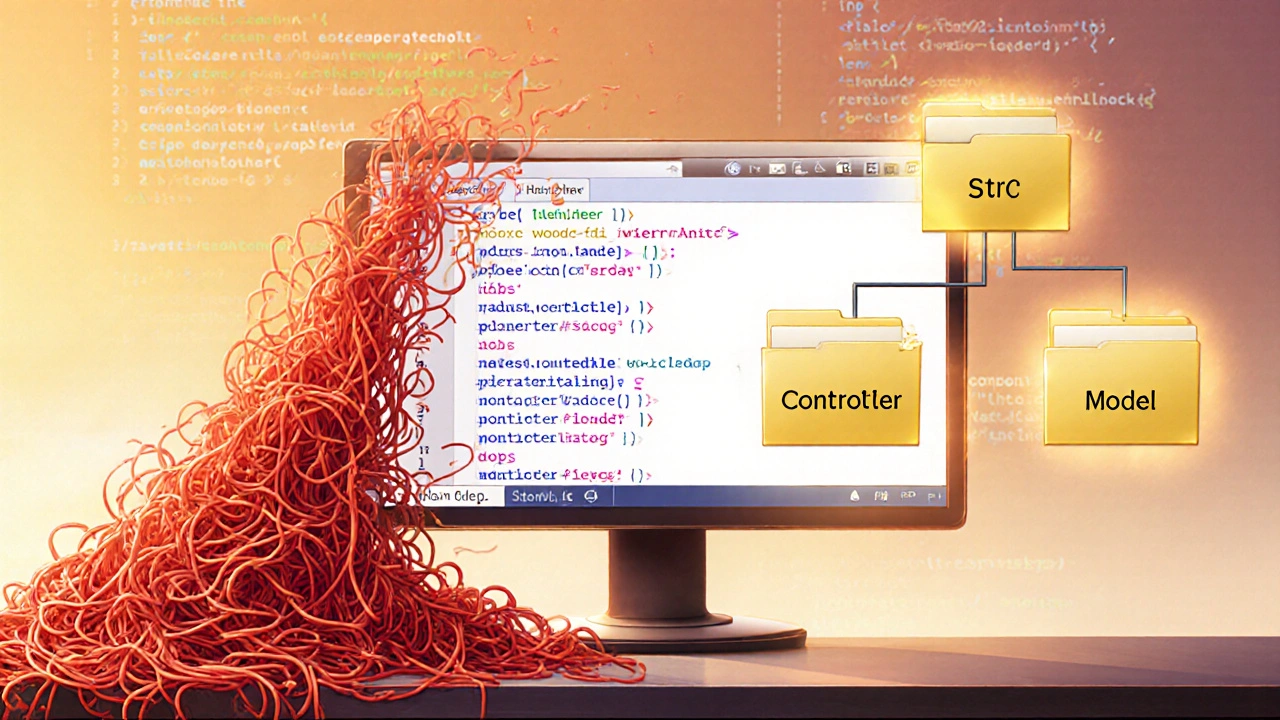PHP Development Checklist
Your progress will appear here as you check items.
Ever felt stuck in a sea of spaghetti code while working on a PHP project? You’re not alone-most developers hit that wall at some point. Below is a practical, hands‑on guide that walks you through proven tricks to clean up your scripts, boost performance, and keep bugs at bay.
Key Takeaways
- Use consistent naming and PHP tricks to make code readable.
- Leverage Composer for dependency management and autoloading.
- Adopt PDO with prepared statements to secure database interactions.
- Follow PSR standards to align with modern PHP frameworks.
- Debug efficiently with Xdebug and unit‑test with PHPUnit.
What is PHP and Why Do These Tricks Matter?
PHP is a server‑side scripting language designed for web development, but it also powers command‑line tools and desktop apps. Since its first release in 1995, PHP has evolved into a mature ecosystem backed by a massive community. Yet, many developers still write code that’s hard to maintain, insecure, or sluggish. Applying the right tricks early on saves time, reduces technical debt, and makes collaboration smoother.
Set Up an Efficient Project Skeleton
The foundation of any clean PHP codebase starts with organization. Follow these steps:
- Create a dedicated folder for your project, e.g.,
my‑app/. - Initialize Composer a dependency manager for PHP that also generates an autoloader:
composer init
This generates acomposer.jsonwhere you declare packages and set the autoloading standard. - Adopt PSR‑4 autoloading in
composer.json:{ "autoload": { "psr-4": {"App\\": "src/"} } }Runcomposer dump‑autoloadto rebuild the autoloader. - Inside
src/, create aControllerfolder and aModelfolder to separate business logic from request handling.
Having a clear folder hierarchy means every new teammate can locate classes in seconds.
Secure Database Access with PDO
Directly concatenating variables into SQL strings is a common source of injection bugs. Switch to PDO PHP Data Objects, a uniform interface for accessing databases and always use prepared statements.
PDO::ERRMODE_EXCEPTION,
PDO::ATTR_DEFAULT_FETCH_MODE => PDO::FETCH_ASSOC,
PDO::ATTR_EMULATE_PREPARES => false,
];
$pdo = new PDO($dsn, 'user', 'pass', $options);
$stmt = $pdo->prepare('SELECT * FROM products WHERE price < :max');
$stmt->execute(['max' => $maxPrice]);
$products = $stmt->fetchAll();
?>
Benefits are threefold: automatic escaping, clearer intention, and reusable queries.

Embrace PSR Standards for Consistency
PHP Framework Interop Group (PHP‑FIG) released a series of PSR (PHP Standard Recommendation) documents. The most useful for everyday coding are:
- PSR‑1: Basic coding standard (
- PSR‑12: Expanded coding style (indentation, brace placement).
- PSR‑4: Autoloading standard, already referenced during Composer setup.
- PSR‑7: HTTP message interfaces-essential if you build APIs.
Adhering to these specs makes your code instantly familiar to anyone who’s worked with Laravel, Symfony, or Slim.
Debug Like a Pro with Xdebug
When a loop runs forever or a variable is unexpectedly null, stepping through code is the fastest way to pinpoint the issue. Install Xdebug a powerful debugging and profiling extension for PHP and configure your IDE (VSCode, PhpStorm, etc.) to listen on port 9003.
- Set breakpoints directly in your source files.
- Inspect variables, call stacks, and even modify values on the fly.
- Use the profiling mode to generate a cachegrind file and visualize bottlenecks with tools like KCachegrind.
Pro tip: enable xdebug.max_nesting_level=200 for deep recursive calls-common in tree‑traversal algorithms.
Write Tests from Day One with PHPUnit
Testing may feel optional during a prototype, but adding PHPUnit the de‑facto unit testing framework for PHP early prevents regressions later.
assertEquals(5, $calc->add(2, 3));
}
}
?>
Run tests with vendor/bin/phpunit. Aim for at least one test per class method-this habit forces you to think about edge cases before you code.
Performance Tweaks You Can Apply Instantly
| Trick | Why It Helps | Example |
|---|---|---|
| OPcache enable | Caches compiled bytecode, cutting execution time. | opcache.enable=1 in php.ini |
| Use native functions | Built‑in extensions run in C, far faster than PHP loops. | array_map() vs. manual foreach |
| Avoid deep recursion | Each call consumes stack memory; replace with iteration. | Iterative factorial instead of recursive. |
| Limit autoload scans | Composer’s class‑map loader is quicker than PSR‑4 for stable code. | Run composer dump‑autoload -o |
These tweaks require little code change yet often shave off 20‑30% of response time on typical web apps.
Integrate with Popular Frameworks (Optional)
If you’re working on larger applications, consider how these tricks fit into frameworks. Both Laravel a modern PHP web framework that follows MVC architecture and Symfony a reusable set of PHP components and a full‑stack framework already embrace PSR standards, Composer autoloading, and built‑in testing tools. For a WordPress plugin, you can still benefit from PDO and Xdebug-just load the extensions in your development environment.
Common Pitfalls and How to Avoid Them
- Mixing echo/print with return statements: Keeps output buffering predictable. Stick to one method per layer.
- Hard‑coding URLs: Use a configuration file or environment variables (via
vlucas/phpdotenv). - Neglecting error handling: Turn on
display_errors=0in production and log to a file with Monolog. - Skipping code reviews: Even the smartest developer misses a typo. Use Git pull‑request checks.
Next‑Step Checklist
- Initialize Composer and set up PSR‑4 autoloading.
- Swap every raw SQL concat with PDO prepared statements.
- Configure Xdebug and run a quick break‑point test.
- Create at least one PHPUnit test for each new class.
- Enable OPcache and run
composer dump‑autoload -obefore deployment.
Cross off each item and you’ll see immediate improvements in readability, security, and speed.
Frequently Asked Questions
Do I need to use a framework to apply these PHP tricks?
No. All the tricks-Composer autoloading, PDO, PSR‑12 style, Xdebug, PHPUnit-work in plain vanilla PHP. Frameworks simply package them together, but you can adopt each piece independently.
How much does Xdebug slow down my app in production?
Xdebug should never be active on a live server. It adds overhead by tracking function calls and memory. Keep it enabled only in your local or staging environment.
Can OPcache cause stale code after deployment?
If you replace files without clearing the opcode cache, old bytecode may linger. Use opcache_reset() after a deploy script or configure opcache.validate_timestamp=1 with a reasonable opcache.revalidate_freq.
What’s the best way to organize tests in a Composer project?
Create a tests/ directory parallel to src/. In composer.json, add a scripts entry like "test": "vendor/bin/phpunit" and run composer test to execute all suites.
Should I always use strict types in PHP?
Yes, if you’re on PHP7.4+ add declare(strict_types=1); at the top of each file. It forces scalar type hints to be respected, preventing subtle bugs caused by automatic coercion.

